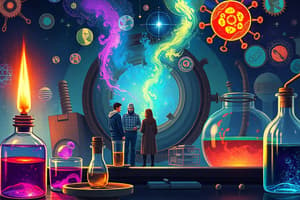Podcast
Questions and Answers
Which step of the scientific method involves making an educated guess based on research?
Which step of the scientific method involves making an educated guess based on research?
- Hypothesis (correct)
- Observation
- Experiment
- Question
What is the function of control variables in an experiment?
What is the function of control variables in an experiment?
- To measure the dependent variable
- To observe the control group
- To manipulate the independent variable
- To provide unbiased results (correct)
Which type of variable varies from individual to individual?
Which type of variable varies from individual to individual?
- Independent variable
- Dependent variable (correct)
- Control variable
- None of the above
What is the purpose of a control group in an experiment?
What is the purpose of a control group in an experiment?
Why is sample size important in an experiment?
Why is sample size important in an experiment?
Which test is used to detect the presence of lipids in a sample?
Which test is used to detect the presence of lipids in a sample?
What is the function of the objective lens on a microscope?
What is the function of the objective lens on a microscope?
What is the equation for calculating the field of view (FOV) of a microscope?
What is the equation for calculating the field of view (FOV) of a microscope?
What is the function of the iris diaphragm on a microscope?
What is the function of the iris diaphragm on a microscope?
What is the function of enzymes in our bodies?
What is the function of enzymes in our bodies?
Where does the Krebs cycle take place?
Where does the Krebs cycle take place?
What is the purpose of sodium fluoride in cellular respiration?
What is the purpose of sodium fluoride in cellular respiration?
What is the purpose of paper chromatography?
What is the purpose of paper chromatography?
What is the equation for photosynthesis?
What is the equation for photosynthesis?
What is the equation for cellular respiration?
What is the equation for cellular respiration?
True or false: The hypothesis is often written using the words 'IF' and 'THEN'.
True or false: The hypothesis is often written using the words 'IF' and 'THEN'.
True or false: Controls are essential for unbiased experiments.
True or false: Controls are essential for unbiased experiments.
True or false: The amount of water given to the plants is the independent variable.
True or false: The amount of water given to the plants is the independent variable.
True or false: Sample size directly influences research findings.
True or false: Sample size directly influences research findings.
True or false: Carbohydrates are the first class of organic molecules.
True or false: Carbohydrates are the first class of organic molecules.
True or false: Nucleic acids are considered organic molecules.
True or false: Nucleic acids are considered organic molecules.
True or false: Benedict's test is used to detect proteins.
True or false: Benedict's test is used to detect proteins.
True or false: Biuret test is used to detect simple carbohydrates.
True or false: Biuret test is used to detect simple carbohydrates.
True or false: Iodine test is used to detect lipids.
True or false: Iodine test is used to detect lipids.
True or false: Sudan IV test is used to detect nucleic acids.
True or false: Sudan IV test is used to detect nucleic acids.
True or false: Dehydration synthesis involves the addition of water to bind monomers together.
True or false: Dehydration synthesis involves the addition of water to bind monomers together.
True or false: Hydrolysis is a process in which an electron is removed from a molecule.
True or false: Hydrolysis is a process in which an electron is removed from a molecule.
True or false: Succinate being turned to fumarate is the 6th step of the Krebs cycle?
True or false: Succinate being turned to fumarate is the 6th step of the Krebs cycle?
True or false: The Krebs cycle takes place in the mitochondrial matrix?
True or false: The Krebs cycle takes place in the mitochondrial matrix?
True or false: Glycolysis takes place in the cytoplasm?
True or false: Glycolysis takes place in the cytoplasm?
True or false: Sodium fluoride stops glycolysis?
True or false: Sodium fluoride stops glycolysis?
True or false: Paper chromatography utilizes the different solubility of pigments and attachment to separate the pigments from each other?
True or false: Paper chromatography utilizes the different solubility of pigments and attachment to separate the pigments from each other?
True or false: Plant pigments absorb the energy from light and control photosynthesis?
True or false: Plant pigments absorb the energy from light and control photosynthesis?
True or false: The equation for photosynthesis is $6CO2 + 6H2O
ightarrow C6H12O6 + 6O$?
True or false: The equation for photosynthesis is $6CO2 + 6H2O ightarrow C6H12O6 + 6O$?
True or false: The equation for cellular respiration is $C6H12O6 + 6O2
ightarrow 6CO2 + 6H2O$?
True or false: The equation for cellular respiration is $C6H12O6 + 6O2 ightarrow 6CO2 + 6H2O$?
What is the main difference between organic and inorganic molecules?
What is the main difference between organic and inorganic molecules?
Which type of reaction involves the loss of water and the formation of a strong covalent bond between monomers?
Which type of reaction involves the loss of water and the formation of a strong covalent bond between monomers?
What is the main purpose of hydrolytic reactions?
What is the main purpose of hydrolytic reactions?
Which test is used to detect the presence of reducing sugars or monosaccharides?
Which test is used to detect the presence of reducing sugars or monosaccharides?
What is the purpose of Sudan IV in the Sudan IV test for lipids?
What is the purpose of Sudan IV in the Sudan IV test for lipids?
Which test is used to detect the presence of proteins?
Which test is used to detect the presence of proteins?
What are amino acids?
What are amino acids?
What are nucleic acids composed of?
What are nucleic acids composed of?
What is the purpose of the Dische Diphenylamine test?
What is the purpose of the Dische Diphenylamine test?
What is the function of enzymes in our bodies?
What is the function of enzymes in our bodies?
Which domain does Escherichia coli belong to?
Which domain does Escherichia coli belong to?
What is the function of pseudopodia in Amoeba?
What is the function of pseudopodia in Amoeba?
Which kingdom does Elodea belong to?
Which kingdom does Elodea belong to?
What is the function of the central vacuole in Elodea cells?
What is the function of the central vacuole in Elodea cells?
What is the function of amyloplasts in Solanum sp. (Potato) cells?
What is the function of amyloplasts in Solanum sp. (Potato) cells?
What is the main component of cell walls in Saccharomyces sp. (Yeast) cells?
What is the main component of cell walls in Saccharomyces sp. (Yeast) cells?
What is the function of cilia in Paramecium?
What is the function of cilia in Paramecium?
What is visible under the microscope in human epithelium cells?
What is visible under the microscope in human epithelium cells?
What is the function of activation energy in enzymes?
What is the function of activation energy in enzymes?
Which domain does Paramecium belong to?
Which domain does Paramecium belong to?
Flashcards are hidden until you start studying
Study Notes
Scientific Method
- Hypothesis involves making an educated guess based on prior research, often structured as "IF... THEN..."
- Control variables are constants that allow for a fair comparison in an experiment.
Variables in Experiments
- Individual variable varies among subjects and can influence experimental outcomes.
Control Groups and Sample Size
- Control group serves as a baseline to compare results, eliminating the influence of external variables.
- Sample size impacts the reliability of results; larger samples provide more accurate reflections of the population.
Lipid and Protein Detection
- Sudan IV test detects lipids, while Benedict's test identifies reducing sugars or monosaccharides.
- Biuret test is used to detect proteins, not simple carbohydrates, which are identified by Benedict's.
Microscopy Functions
- Objective lens magnifies the specimen for a detailed view.
- Iris diaphragm controls the amount of light that reaches the specimen, improving visibility.
Calculations in Microscopy
- Field of view (FOV) is calculated based on the diameter of the lens used.
Enzymatic and Cellular Processes
- Enzymes speed up biochemical reactions and lower activation energy.
- Krebs cycle occurs in the mitochondrial matrix and is crucial for cellular respiration.
Molecular Functions
- Sodium fluoride inhibits glycolysis, affecting energy production.
- Paper chromatography separates pigments based on solubility and adherence.
Photosynthesis and Cellular Respiration Equations
- Photosynthesis: (6CO_2 + 6H_2O \rightarrow C_6H_{12}O_6 + 6O_2)
- Cellular respiration: (C_6H_{12}O_6 + 6O_2 \rightarrow 6CO_2 + 6H_2O)
Organic vs. Inorganic Compounds
- Organic molecules contain carbon and usually have covalent bonds, while inorganic molecules do not primarily consist of carbon chains.
Chemical Reactions
- Dehydration synthesis involves the removal of water to bond monomers, leading to the formation of larger molecules.
- Hydrolytic reactions add water to split molecules apart.
Plant and Microorganism Functions
- Pseudopodia in Amoeba assist with movement and feeding.
- Central vacuole in Elodea cells stores nutrients and maintains turgor pressure.
- Amyloplasts in Solanum sp. (Potato) store starch.
Cellular Structures
- Cell walls in Saccharomyces sp. (Yeast) primarily consist of chitin.
- Cilia in Paramecium facilitate movement.
- Human epithelium cells display structures under microscopic examination, often including nuclei and cytoplasm.
Nucleic Acids and Proteins
- Nucleic acids are made of nucleotides, forming DNA or RNA.
- Dische Diphenylamine test detects DNA through a color change.
Classification of Organisms
- Escherichia coli is classified under the domain Bacteria.
- Paramecium also belongs to the domain Eukarya, as it contains a defined nucleus.
True or False Statements
- Controls are essential for unbiased experiments.
- The amount of water given to plants is the independent variable.
- Sample size directly influences research findings.
- Carbohydrates are the first class of organic molecules.
- Nucleic acids are organic molecules.
- Benedict's test measures reducing sugars.
- Hydrolysis removes electrons from a molecule (false).
- Succinate to fumarate is not the sixth step of the Krebs cycle (false).
- Glycolysis occurs in the cytoplasm.
- Paper chromatography examines the solubility of pigments and their properties.
- Plant pigments are critical for absorbing light energy in photosynthesis.
Studying That Suits You
Use AI to generate personalized quizzes and flashcards to suit your learning preferences.




